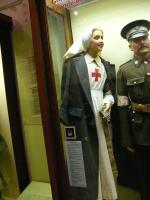1°GM 1914 Red Cross Nurse Bruxelles
English Translation
Historique Voir ICI
History Click HERE
World War I (article WEB)
World War I (also known as the Great War, the War of Wars, or the First World War, abbreviated WWI) began in June of 1914 with the assassination of Archduke Francis Ferdinand. The war lasted until November 1918. The lives of Americans in World War One would never be the same again. Many soldiers suffered severely from PTSD, or Post Traumatic Stress Disorder (Everyone Has Their Breaking Point). Sadly, the nurses could not prevent or treat this disorder. During this four year time period, over 21 million were wounded. These 21 million were cared for by the nurses that served in WW1
Women in the Military
The first war that allowed women to openly serve in the army was World War I. This was made possible by the establishment of the Army Nurse Corps. The Army Nurse Corps was founded in 1901, and allowed women to enter the military legally. However, combat access was denied to women still. Some women took up jobs as occupational and physical therapists2 and served in hospitals overseas and in the U.S.3; most women served as nurses for the U.S. Navy and U.S. Marine Corps
Over 30 thousand women served as nurses during WWI. Many were given medals and other honors for their service. The Distinguished Service Medal, the Army’s highest noncombat award, was given to several nurses. The nation’s second highest military honor, the Distinguished Service Cross, was awarded to at least three Army nurses. Over twenty nurses received the French Croix de Guerre. Many nurses were wounded and died while trying to rescue wounded soldiers on the frontlines
American Red Cross
The American Red Cross was founded in 1881 by Clara Barton. The American Red Cross worked during WWI alongside many other relief organizations. They established hospitals, procured ambulances, and above all, recruited nurses. By the end of the war, the American Red Cross had expanded to provide aid to veterans and their families
Role of Nurses
The nurses of WWI worked on the front line, picking up the wounded soldiers. They made dressings for scars and battle wounds, ran canteens, and drove ambulances. Nurses also organized, cleaned, and set-up hospital rooms and equipment.3 Experienced nurses were stationed at hospitals along the frontlines. These hospitals only received the severely injured soldiers.5 In a letter written to generate funding for support in hospitals overseas during the war, a nurse elaborates:
Life Style of Nurses
Nurses of WWI worked from sun up to sun down, and barely got any sleep. However, this did not bother many nurses. The conditions were cold and sometimes rainy. The sounds of the battlefield could be heard in the nurses’ living quarters.5 An American nurse wrote a detailed description of her morning and nights on the frontlines:
It is a marvelous life; and strangely enough, despite all the tragedy, I call it a healthy one. One works, and when that is over one sleeps enough to keep in condition, and that is absolutely all, except a cold sponge bath (no bath-tubs here), and an eau de cologne rubdown in the morning, and the walk to and from the Hospital. In the morning now it is bitter cold and misty and half dark, and one gets weird glimpses of departing regiments, and white-capped old market-women, and pointed gables across the gloom; and at night the splendid stars, and now a great lustrous moon, and every day and night the boom, boom of the cannon which sounds very awesome these days. That is all I know of the world I live in
Nurses sometimes shared rooms with civilians while serving in the war.







.JPG)
.JPG)
.JPG)

